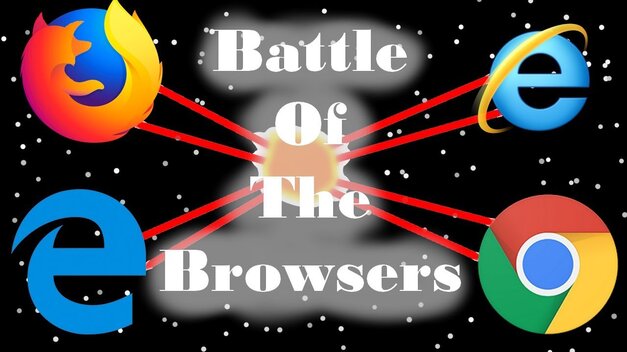
In today’s world, there are a multitude of choices to make when it comes to just about everything. And when it comes to web browsers, the options seem endless. So, which one should you use? In this blog post, we’ll pit four popular web gateway against each other in a battle royale to see which one comes out on top: Google Chrome, Microsoft Edge, Opera, and Vivaldi.
Google Chrome
Google Chrome is a free and open-source web developed by Google. It was first released in 2008 for Microsoft Windows and has since been ported to Linux, macOS, iOS, and Android. The browser is based on the Chromium project and Blink layout engine and can be considered a successor to Google’s previous web gateway, Google Browser Synchronizer.
Microsoft Edge
Microsoft Edge is a cross-platform web gateway developed by Microsoft. It was first released for Windows 10 and Xbox One in 2015, then for Android and iOS in 2017. It is based on the Edge HTML layout engine and is the default web browser on Windows 10 devices. It replaced Internet Explorer as the default web browser on all supported versions of Windows 10.
Chrome vs Edge
Chrome and Edge are the two most popular on the market today. They both have their pros and cons, but which one is the best? Chrome is faster and more stable than Edge, but it uses more battery power. Edge is less stable than Chrome, but it doesn’t use as much battery power. So, which is the best? It depends on your needs. If you need a fast and stable browser, Chrome is the best choice. If you need a browser that uses less battery power, Edge is the best choice.
Chrome vs Edge are two of the most popular web gateway available today. Both offer a fast, reliable experience with a variety of features and extensions to choose from. So, which one is the best?
Chrome is a great choice for users who value speed and security. It’s also compatible with a wide range of devices and operating systems. Edge, on the other hand, is perfect for users who want a more streamlined browsing experience. It’s also convenient for users who frequently switch between devices since it offers seamless synchronization across all your devices.
So, which is right for you? If you’re looking for speed, security, and compatibility, Chrome is a great choice. If you want a more streamlined browsing experience, Edge is the way to go.
Opera
Opera is a cross-platform, freeware web browser developed by Opera Software AS. It was first released publicly in 1996 for Windows 3.1x and later for other platforms including macOS, Linux, FreeBSD, Solaris, etc. The Opera browser is based on the Presto layout engine and can be considered a successor to Opera’s previous web browser, Opera Mobile.
Vivaldi
Vivaldi is a freeware, cross-platform web browser developed by Vivaldi Technologies AS. It was first released in 2016 for Microsoft Windows and has since been ported to Linux, macOS, iOS, and Android. The Vivaldi is based on the Chromium project and Blink layout engine and can be seen as a successor to Opera’s previous web browser, Opera Synchronizer.
Opera vs Vivaldi
The debate between Opera and Vivaldi is one that has been going on for some time. Both browsers have their pros and cons, and it can be difficult to decide which one to use for everyday web browsing. In this article, we will compare the two browsers side-by-side, in order to help you make an informed decision.
Opera is a well-known web browser, with a long history. It has been around since 1994, and is still popular today. Opera has a simple, yet powerful interface, and is a great choice for both casual web browsing and more advanced users. It has many features, including an ad blocker, private browsing, and a built-in VPN. Opera also has a built-in data saver, which can save you money on mobile data costs.
Vivaldi is a newer web browser, but it has quickly gained popularity. It has a unique and customisable interface, which allows you to tailor the browser to suit your needs. Vivaldi also has a built-in ad blocker, private browsing, and a built-in VPN. It also has a built-in note-taking feature, which can be handy for keeping track of your research and other tasks. Vivaldi also has a feature that allows you to group tabs, so you can easily keep track of different websites.
When it comes to performance, both Opera and Vivaldi are fast and reliable. However, Vivaldi is slightly faster at loading pages, especially when compared to Opera’s data saver feature. Vivaldi also has a more advanced developer toolkit, which can be helpful when debugging websites.
In terms of usability, both browser are fairly user-friendly. Opera has an intuitive interface, and it is easy to learn how to use the browser. Vivaldi, on the other hand, has a more customisable interface, and it can take some time to get used to the different features.
In conclusion, both Opera and Vivaldi are excellent browser, and it is up to you to decide which one best suits your needs. They both have great features, and both are fast and reliable. However, Vivaldi is slightly faster than Opera, and has some more advanced features. Ultimately, it comes down to personal preference, and which features you feel are most important.
Conclusion:
In conclusion, when it comes to choosing the best browser, it ultimately comes down to user preference. Chrome and Edge are both excellent options, offering great performance and features. Opera and Vivaldi are more specialized and offer more customization, allowing users to tailor their web browsing experience to their own needs. Ultimately, the best browser for you will depend on the features you are looking for and the way you use the internet.
So, which one wins? All of them! Each web browser has its own strengths and weaknesses; it just depends on what you’re looking for in a browsing experience. If you want something that’s lightweight and fast with minimal bells and whistles, Chrome or Edge might be for you. If you’re looking for something with more customization options and built-in features like VPN or ad blockers, then you might prefer Opera or Vivaldi. Ultimately, it’s up to you to decide which one is best!
| You may also read : Top 5 Study Hall Innovation Devices |


